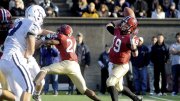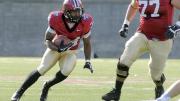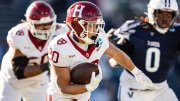It was the championship season that wasn’t. Heavily favored to retain the Ivy League title, the football team rolled over its first five opponents, outscoring them 205-67. Then came the October Surprise. In a calamitous fourth quarter at Princeton, Harvard blew a 34-10 lead, allowing 29 points in the game’s last 11 minutes. The 39-34 loss—perhaps the most deflating defeat in Crimson football annals—snapped a 14-game winning streak and scrambled the race for the Ivy trophy.
Successive losses to Cornell and Pennsylvania dropped Princeton to third place in the Ivy standings, leaving Penn and Harvard—both with 4-1 league records—to fight it out for the championship on the second-to-last weekend of the season. That brought the November Surprise. A Penn team that had taken four Ivy games by slim margins took the measure of Harvard, 30-21.
With a narrow victory over Cornell the next weekend, Penn won the league title outright, and for the third time in the last four years the Ivy trophy went south. Harvard’s 8-2 season was climaxed by an unexpectedly tense 34-24 victory over Yale—the Crimson’s sixth straight in the 129-game series, and the eleventh in the teams’ last 12 meetings.
The princeton shocker and the upset at Penn’s Franklin Field were jolting plot twists in the narrative arc of the highest-scoring Harvard team of the modern era. The Crimson’s lethal offense scored a total of 394 points, breaking the single-season record of 374 set in 2011. Senior quarterback Colton Chapple threw a record 24 touchdown passes, and set new marks for passing and total offense. Senior tailback Treavor Scales ran for 1,002 yards and led the league with 13 rushing touchdowns.
The team showed its striking power by scoring 21 fourth-quarter points in each of its first two games—a 28-13 victory over the University of San Diego and a 45-31 slugfest at Brown—and by piling up 49 first-half points in a rain-soaked 52-3 wipeout of Holy Cross. Scales had a career-high 173 yards rushing and two touchdowns against San Diego, and 136 yards and four touchdowns at Brown. Chapple passed for four touchdowns and ran for another against Holy Cross, and he repeated that feat the next weekend, throwing four touchdown passes and scoring another on foot in a 45-13 win over Cornell.
Chapple’s ability to make plays with his feet also helped the team to its fifth win, a 35-7 rout of Bucknell. In just over two quarters, he ran for 120 yards and two touchdowns—one of them on a 59-yard breakaway—and threw scoring passes to tight ends Cameron Brate ’14 and Kyle Juszczyk ’13. Like Chapple’s long run, Juszczyk’s catch-and-run covered 59 yards.
Harvard seemed to have the Princeton game won when the unthinkable happened. The Crimson had dominated the opening half, amassing 451 yards of total offense to Princeton’s 51 and holding a 21-0 lead at the break. Trailing 34-10 with 13 minutes to play, the Tigers proceeded to bombard the Harvard secondary with scoring passes of 7, 29, 20, and 36 yards—the last one with 13 seconds left on the clock. Missed tackles, penalties, and a dropped interception with 38 seconds to play all worked to keep Princeton drives alive. Almost obscured by the defensive collapse was a spectacular performance by Chapple. He had thrown five touchdown passes, matching a single-game record he’d tied the previous season, and his 448 passing yards broke the Harvard record of 443 set by Neil Rose ’03 in 2002.
The team was on track again in a 31-14 night victory at Dartmouth a week later. Scales led the ground attack, rushing for 89 yards and three touchdowns. The Crimson’s strong run defense, then ranked first in the NCAA’s 122-team Football Championship Subdivision (FCS), held the Big Green rushing attack to 19 yards on 24 carries.
Back at the Stadium, 10 different players scored points in a 69-0 shutout of Columbia. In the two quarters he played, Chapple accounted for four touchdowns, three in the air and one on foot. The final score was the most lopsided in Ivy League annals.
The terminal tussle with Yale has been canonized as The Game, but in the annual race for the Ivy League title, the game is now Harvard-Penn. For the past 15 seasons, every meeting of the two teams has had title implications, and in 12 of those seasons the winning team has gone on to claim the Ivy trophy.
Harvard traveled to Franklin Field with a chance to redress the damage inflicted at Princeton and reclaim first place in the standings. But its bid was quashed by a fired-up Penn team that contained the Crimson attack, outmuscled the defensive line, and left the field with a 30-21 upset. The Quakers’ game plan was to challenge Harvard’s seemingly impregnable rushing defense, and the tactic worked. The Crimson defenders, who had held opposing rushers to 43.4 yards per game and led the FCS in quarterback sacks, yielded 227 yards on the ground and failed to register a sack. With 130 yards rushing, Quaker tailback Lyle Marsh became the first and only opposing back to break 100 against Harvard. Billy Ragone, Penn’s senior quarterback, ran for 95 yards, passed for two touchdowns, and scored another on foot before going down with a fractured ankle in the third period.
Behind 28-14 in the final quarter, the Crimson scored on a short pass from Chapple to Juszczyk. But the offense couldn’t close the gap in the 10 minutes that remained, and the Quakers added a two-point safety with an end-zone sack of Chapple as time ran out.
A Crimson triumph at the Stadium the next weekend looked like a safe bet, but the combativeness of a Yale team with a 2-7 record came as a second November Surprise. Harvard took the field as a prohibitive favorite, but was given a rigorous test by a shape-shifting Yale defense and an injury-riddled offense that had two former junior varsity receivers filling in at quarterback.
Encumbered by turnovers and drive-breaking penalties, the game’s opening half was a 3-3 stalemate—an anomalistic scenario for a Crimson offense that had been averaging 24.4 first-half points. All that changed in a furiously contested second half. After taking a 6-3 lead on junior placekicker David Mothander’s second field goal of the game, Harvard went up 13-3 when Chapple rolled out to pass, scrambled to his right, and sprinted 18 yards to the end zone. The lead would change hands four times over the next 15 minutes.
A 46-yard pass from fifth-string quarterback Henry Furman to receiver Cameron Sandquist set up a three-yard touchdown by sophomore Tyler Varga, Yale’s hard-running back-of-all-work. The Blue then forged ahead, 17-13, after receiver Grant Wallace made an unlikely catch in an end zone crowded with Crimson defenders. Harvard regained the lead on a 32-yard pass from Chapple to wide receiver Andrew Berg ’14, but an interception on the Crimson’s next series allowed Yale to score once more on a short-yardage dive by Varga, putting the Blue ahead, 24-20.
On Harvard’s next play from scrimmage, Chapple broke loose on a quarterback draw and dashed 61 yards to Yale’s nine-yard line, where he was caught by Eli cornerback Collin Bibb. After a pass-interference penalty moved the ball to the four-yard line, Chapple and tight end Cameron Brate confected The Game’s decisive play.
“When we broke the huddle,” Chapple said later, “Cam told me, ‘If I’m covered, give me a high ball.’ You can’t draw it up any better than that. He made an unbelievable play.” Outjumping Ryan Falbo, a six-foot-three Yale linebacker, the six-five Brate hauled down Chapple’s perfectly thrown pass for the go-ahead touchdown.
A strong defensive stand forced Yale to punt on its next possession, but with 1:19 left on the clock, Harvard faced a third-and-13 and the distasteful prospect of returning the ball to Yale. Taking a pitch from Chapple, Scales raced down the right sideline for a 63-yard touchdown that clinched Harvard’s win.
“We had nothing left,” said coach Murphy afterward. “We gave it everything we had. We didn’t just have to make plays—we had to make really big plays to win this game. It was a great heavyweight fight, and we landed the last punch.”
Tidbits: With an Ivy record of 1-6 (2-8 overall), Yale finished last in the league for the third time in three decades. The Eli’s sole Ivy win was a 27-13 upset of Penn.
Precocious: In his 17 varsity starts—the first seven in backup roles—Colton Chapple came within two touchdown passes of tying the Harvard career record of 41 set in 2002 by Neil Rose, a starter for three seasons. In five of his starts, Chapple passed for four touchdowns or more. No Crimson passer had ever recorded more than two such games.…Chapple ranked second nationally in passing efficiency, and his 3,169 yards of total offense (an average of 7.9 yards per play) set a Harvard single-season record. Against Yale he completed 22 of 32 passes for 229 yards and two touchdowns, and ran for a career-high 128 yards.…“We’ve had such a lineage of quarterbacks, but I don’t think anyone has been a better decision-maker, been more poised,” said coach Murphy. “It’s amazing how he can just get everything to play in slow motion—just seemingly doing all the right things, all the time.”
Finishing touch: Scales’s 63-yard breakaway in the Yale game was his 29th career touchdown. “I have never seen Treavor run so fast, I guarantee you that,” said Chapple after the game.…Only Clifton Dawson ’07, with an astonishing 66 touchdowns, has scored more in a Harvard career.
Crimson state: Because Chapple and Scales both played high-school football in the Greater Atlanta area, the Atlanta Journal-Constitution sent a staffer to cover The Game. As writer Mike Knobler noted in his report, “Georgia is not only a red state but a Crimson one as well. Harvard has 157 undergraduates from Georgia, 13 of them on its football roster. There were no Georgia players dressed in Yale blue.” Harvard scouts will surely continue to keep Georgia high-schoolers in their sights.
Triple threat: Kyle Juszczyk, a bruising runner and blocker who could line up at tight end, slot back, or fullback, was the team’s top receiver, with 52 catches for 706 yards and eight touchdowns. His 22 career touchdown catches are the third-most in Harvard annals.
Front four: The Crimson’s defensive line—seniors John Lyons, Nnamdi Obukwelu, and Grant Sickle, and junior Jack Dittmer, with sophomore Zach Hodges as swing man—ranked second nationally in rushing defense, holding opponents to an average of 69.4 yards per game. Harvard led the FCS in quarterback sacks, with 4.2 per game.
All-Ivies: Linebacker Josh Boyd ’13 (’14) and tight ends Juszczyk and Brate were unanimous all-Ivy selections. Chapple, Scales, guard John Collins ’13, and center Jack Holuba ’13 also made the offensive first team, while end Zach Hodges was a first-team defensive choice. Placekicker David Mothander and punter Jacob Dombrowski ’13 were first-team kickers. Nine others earned second-team or honorable-mention citations.…Chapple won the Bushnell Cup as the Ivy League’s offensive player of the year, and received the New England Football Writers’ Gold Helmet Award as New England player of the year.
Laurels: Chapple also won the Crocker Award, given annually to the team’s most valuable player. Scales received the LaCroix Award for enthusiasm, sportsmanship, and loyalty. The inaugural Joe Restic Award for scholarship, leadership, and integrity—memorializing the innovative coach who guided the Crimson from 1971 to 1993, and died a year ago—went to team captain Bobby Schneider. A linebacker, Schneider was leading the team in tackles when he broke his arm in the Princeton game. After four weeks on the sideline, he took the field for the final play against Yale.
Captain-elect: Josh Boyd, of Hyde Park, Massachusetts, and Adams House, will captain the 2013 squad. A sociology concentrator, he led the Crimson defense with 67 tackles.
Not-quite-full house: Though rows of seats in the Stadium’s colonnade were empty, The Game was announced as a sellout, with a stated attendance of 31,123.…The average draw for the season’s five other home games was 7,599.
Upper hand: Harvard now leads Yale, 32-24-1, in games played since the formalization of Ivy League play in 1956. Coach Tim Murphy is 14-5 against the Blue.
New high: The Crimson’s 394-point season broke the Ivy League record of 375, set by Brown in 2000.
Westbound: The 2013 campaign will kick off with a road game against the 2012 season’s opening-day opponent, the University of San Diego, at Torero Stadium on September 21. Harvard’s last West Coast venture was a 44-0 mismatch with Stanford in 1949.










